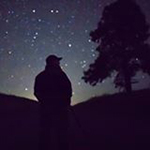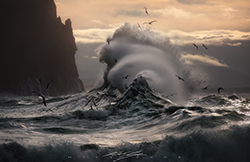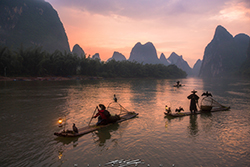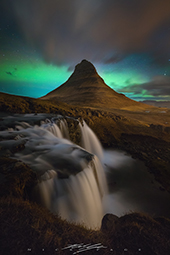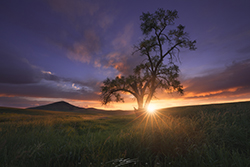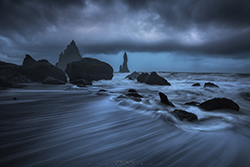
|
|
|||||
|
Featured Photographer, September 2017: Nick Page
We are happy to have Nick Page as our featured guest photographer this month. We appreciate that he gave us some of his time and generously shared his beautiful photography with us! Please visit his links to see more of his work, and to let him know you enjoyed this interview. :: How did photography start with you? Which was first? Outdoor photography or the sports and portrait side of photography? The portrait side actually started first for me. As most parents, photos of your kids typically comes first. But I have always loved exploring backroads, and seeing new things, and eventually that love got me pointing my first camera at the world outside, and the parts of it I loved. :: Which of the subject matter do you think comes the most naturally to you, and why? I think that nature photography is where i am the most zen, but to say it comes easy.. that might be an overstatement. Like a lot of photographers, I am a pretty technically minded person, which means that the tech side of photography, comes fairly quickly, its the creative inspiration that I struggle with at times. Landscape and Nature photography is such a nice way of getting out, doing what you love, and it doesn't even matter if you come home with that wall art you're hoping to create, your still out, in nature, in your natural habitat, and acting, rather than sitting at home, reacting to the accomplishments of others. :: When I look through your landscape portfolio, what I notice is a lot of the images have a very dominant color theme...whether it's blue, red, gold, green, is that something you intentionally look for in the field, or something you will put into place in a more pronounced way after shooting? I guess the follow up is how important is color to what you want to express to the viewer? Controlling Color is something that I am putting a lot of effort into these days. When we look at a scene with our eyes, we see pretty much only what we want to see, our eyes ignore the distractions in the mid ground, and the crazy color palette of the 10,000 shades of green and yellow in the grasses. But our camera, it doesn't ignore all that stuff. A super busy color palette makes for a distracting, hard to take in photo for the view. When a Painter sits down to paint their masterpiece, they often aren't breaking out every shade of green to paint that field of grass. I try to simplify my color palette in most scenes, which helps to simplify the shot for the eye, and make the photo easier to take in and explore with the eye. Not every shot needs it, but many do. Not only that but Color plays a huge role in the mood of a photo. Warm tones feel happy, cool tones feel somber.. so while I am not going too crazy with color, I certainly use color to help me convey the mood or emotion I am striving for with the photo. :: Can you talk a little about the podcast, and what you hope to express to the listeners/viewers? What is the most challenging part about creating something that is not only auditory, but visual as well? The Inspiration for “The Landscape Photography Podcast” is to create a show specifically for the Nature photographers among us. For the longest time I would be driving to my sunset location, listening to a show about gear, street photography, or portrait photography, and it just didn't make sense that there wasn't a show for the millions of nature photographers out there. I try to keep the show conversational, real, but valuable. I bring on other knowledgeable talented photographers that I have much respect for, and try to milk out valuable nuggets of wisdom in a conversational format and focused topic that they are knowledgeable about.its hard to have an audio podcast about a visual art. For that reason I occasionally do a video version of the show as well that goes up on my Youtube Channel, which really helps when we can talk about, and display the photos that we are talking about. :: What trend in landscape photography is driving you nuts these days? Does being able to shoot other types of work help you make a lesser issue with some of the craziness that can swirl around the landscape community? Landscape photography can be such a blessing and a curse. It has the ability to preserve and protect habitats, raise awareness, and completely destroy nature's most beautiful locations. The saying, “celebrating a place to death” comes to mind. there is a repeating pattern where, photographer finds beautiful location.. posts photos of that great location.. other photos flock to that spot, share that location.. then comes tourism and hoards of people. So many of our most beautiful locations in the Pacific Northwest are being forever trampled and inundated with tourists. While it's great that people are getting out and visiting these beautiful locations, the locations will either be ruined, or fence will go up, and the experience will be ruined. A place that you could visit 4 years ago, be all by yourself, and witness the moss growing over the all the rocks.. will likely have many other people, destroying the mossy areas, or there will be fences put up, and photographing the same places you photographed just a couple years earlier, will now be met with greatly to blame for the change in these areas. :: I think in looking at landscape work that is currently being created, there are so many styles, and processing is a part of that in a big way. Where do you draw the line with your processing? Finding the lines you will and won't cross is a big part of someone finding their style and direction. I am going to preface what i am about to say by saying.. photography IS art... there is no such thing as wrong, as long as you're not trying to pass off what you do as 100% real. Having said that, I don't do composites or replace skies, mostly because I feel it would take the fun out of chasing that good light, and trying to capture something special at a special place. I will do some things such as focal length blending to better convey the experience of a place, because we obviously don't see the same as our wide angle lens, and sometimes you just need to make that mountain in the background look as it did in real life. But I dont composite in flowers rivers or skies, because that would ruin the challenge and reward of actually finding those compositions in real life. :: What do you struggle with the most when it comes to being a photographer? Photography is an art, and like all art it requires inspiration and enthusiasm to do it well. Sometimes life happens, kills that inspiration and enthusiasm, and if photography is your livelihood like it is mine, it can be incredibly difficult to put on a good face and push forward. Having to lead workshops and do photoshoots right after the loss of a loved one or a divorce can be incredibly difficult, but when you're a full timer, it's something you just have to do. :: I think most people who follow your work, or listen to the podcast remember you had some pretty rough parts over the summer...no need to elaborate if you don't feel like it...but I'm curious how photography helped with those bad times...and how you felt your work changed during it? What did you take creatively from that period that you'll be able to draw upon in the future? Inspiration is a funny thing. Like most art forms, grief, and emotional pain can be as inspirational for photography as any other emotion. Actually I take that back it can be MORE inspirational that other emotions. This summer I led a workshop in Iceland, and when I got off of the plane in Iceland, I got the call that my mother had passed away during my flight. It wasn't a surprise, but you're never ready for losing your parents. It put a huge cloud over my Icelandic trip. Then when I came home after the trip, I came home to my girlfriend of 4 years leaving me. It was probably one of the top two darkest times in my life. And its safe to say, it came through in my photos. I didn't slow down with producing photos. In fact I found a release in pumping out some of the darkest, most depressing gloomy photos I could create. Looking back I was probably crying out for attention of some kind. But I still look at that Iceland Batch of photos as some of the most inspired work I have created. Not a very happy set of images, but to me they have true emotion. Which I will always relive when I look through those photos. :: Is there any innovation with the equipment side of the business you're hoping we start to see in the next couple of years, or are we already too far with what cameras and software can do? For Landscape photography, really there are two specs that I care most about in cameras. Dynamic range, and high ISO performance. Lets be honest, just because I CAN exposure blend, doesn't mean I WANT TO. hahaha. The files from my current 5d IV aren't bad, and in most cases I can dual process a single RAW file and get what I need, but there are always limits. I dream of the day when I can shoot straight into the sun, and still not have to bracket to get clean shadows. Speaking of clean shadows, Astrophotography! It wasn't that long ago that photographers were just excited to be able to photograph the Milkyway. Now we are picky and want to be able to do it without noise AND nice detail in our foregrounds. Funny thing about new moon nights... they are very very dark. I would love a camera I could shoot at iso 20,000 with little to no noise.. get nice detail in my foreground for those nightscapes, and not have to do any post processing backflips to make my foreground come out clean. :: Part 1 - What has been the scariest thing that has happened to you while on a landscape shoot? Part 2 - What has been the craziest thing you've had happen while photographing a wedding? Well, some places on the Oregon Coast, deserve their reputation. Cape Kiwanda is one of them. At the tip of the Cape, there is an area we call “The bowl”. During good surf days, the waves will crash up and splash nice and high up the 90' tall cliff face then recede back down into the pacific. Its a great beautiful shot when it comes together, but its also not worth the risk. I stood there, watching waves for about 15 mins, before I decided, yeah, its definitely safe to go stand down on that slope so I can get a nice foreground. It was bare dry, no waves had even came close, and besides I am at least 75' above the water level, no way will a wave make it up here. 2 mins later.. this wall of water comes shooting at least 15 feet above my head, throwing thousands of gallons of water on the slick slope uphill from me, behind me. Knowing that water would be coming down the slope in an effort to flush me out to the sea, I did the only thing I could.. I grabbed my tripod and slammed it down into the slick sandstone, using the camera as part of my traction... the water came, and luckily I didn't go with it. But waves come in sets, and I knew I needed to get out of there before the next one came, so I was left to scramble up a steep, slick, wet, sandstone slope with wet shoes in a panic. I got out, my camera survived, and luckily I did too. So, there I was, doing the Ring Shot. I had the bride's bouquet propped up on this small table on a back deck of the Bridal sweet. I had some really nice back light with early morning sun, as well as some nice flash making stuff pop.. it was all coming together I just needed to make small adjustment with the rings... tink tink...CRAP. The bride's ring falls off the table, between two boards and UNDER THE DECK. No need to panic I will just go down and get it. There is Nick.. Crawling on his hands and knees under a deck.. looking looking.. then finally finding the brides, now filthy engagement ring.. luckily with Diamond still attached.... needless to say, what happens on the back deck, stays on the back deck. :: How is it being on the sidelines for a professional football game? What is something you thought you knew before you did it...and what was the reality when you finally got on the field to shoot? First of all.. its the ONLY way to watch a game. Standing there, shoulder to shoulder with the special teams guys... trying to play it cool, walking through the tunnel, bumping into the QB as he makes his way to the field, giving Matt Stafford the nod of approval. Its so surreal. My first impression on the sidelines of an NFL game was, These guys are huge.. and freakishly fast. when you take a 6'8” Lineman.. put cleats and a helmet on them.. they become 7'0”... and crap they are running right at you! The adrenaline of shooting NFL is something I hope never ever wears off as I shoot more games. Another thing that really strikes you is now the rivalry is completely over when the game is over. The guys are out on the field, swapping jerseys, and flagging down photographers like myself for a quick photo opp. :: I'm always fascinated by the way photography (especially outdoor related) works when it comes to social media...and how the necessary evil of needing to promote ones work requires at least some involvement with the various platforms. Which platforms do you find the most useful, which drive you crazy? Please give a little insight on your stance when it comes to social media, and what you will post, and what you try to stay away from posting. As visual artists, I think we all have that part of us that wants to hold it up for everyone to see and say... look what i did! Social media is great for that. For people like me that also shoot weddings and portraits, its also a great source of free marketing, what could be better than an image driven place where EVERYONE is. Facebook used to be the place to be, but anymore I am finding that Instagram is where the people are, and where the algorithms are the most friendly. Who knows how long that will last however. I find that I can post the same photo on IG as FB and get about 6-10 times the reach. I wish the images were displayed better, but eyes are eyes. And as a photographer, I have to go where the people are. :: With the social media boom, gear becoming better, it seems the pathway to being a photographer is getting easier...will we get to the point where the job is no longer viable? What's to stop everyone from being a part of this circus? Yes and No. There is no denying that photography is getting easier to learn, the gear is getting better and the bar for entry lower and lower. As a result.. it is going to be devalued, there is no getting around that. However i don't think it will always be that way. Like anything, popularity rises and falls.. as something gets devalued, people lose interest in aspiring to do it. If you can't be that rich famous guy any more.. it will cull out a lot of people that would have done it for that reason.. and it will be left to the rest of us that do it for the passion of it, rather than the lucrative potential of it. :: Excluding the work of other photographers...what do you draw inspiration from? I love watching how TV and Movies are color graded. You can learn so much from the way scenes are lit. the colors are controlled, and emotion is conveyed through light and color in film. :: What is your favorite piece of non-photographic gear and why? The NRS boundary Sock with Hydro Cuff. Basically it's a wetsuit that goes up to your knee. Throw a pair of cheap light sandals over the top and you have a water wading system that easily fits in your bag, keeps you warm in sub zero temps, and is light and easy to care for, carry and pack. I love them! |
"...photography IS art... there is no such thing as wrong, as long as you're not trying to pass off what you do as 100% real."
Photographer Spotlight Interviews
|
|
 |
Other Cool Stuff→ Past Workshop Photos → 72dpi.com → How-To Articles → Photographer of the Month |
 |
Contact Us→ Contact Us → About Us → Site Map |
© 2009-2024 Aperture Academy, Inc.
